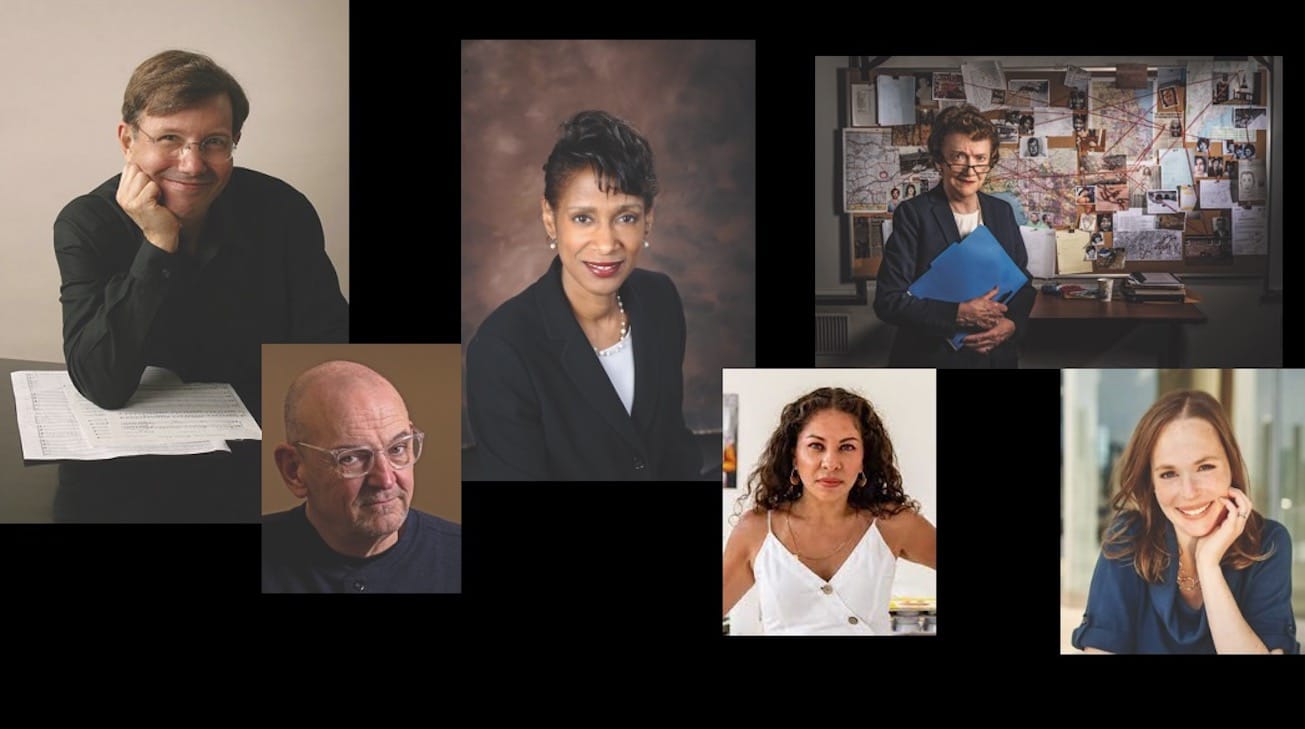Schemel Forum’s World Affairs Seminars Set for Fall

The University of Scranton’s Schemel Forum will present six World Affairs Luncheon Seminars this fall, featuring highly accomplished speakers presenting a range of timely topics.
The luncheons will take place from 11:30 a.m. to 1 p.m. in Brennan Hall’s Rose Room 509, with the exception of the first event. There will also be a Zoom link for those who wish to attend remotely.
The series begins Friday, Sept. 8, with “We’ve Got to Get Ourselves Back to the Garden: Inside the Music and Times of the Woodstock Generation,” presented by composer, conductor, music commentator and author Rob Kapilow, H ’09. The lecture will take place in the Kane Forum of Leahy Hall.
At the talk, Kapilow will bring the 1969 Woodstock Festival back to life through “zooming in on drum fills, bass lines, trumpet licks and background vocals, and zooming out to the racial, cultural and social turmoil of a revolutionary decade that led to a new musical voice for America.”
That evening, Kapilow will perform at Performance Music at The University of Scranton’s “What Makes It Great? The Great American Songbook” concert at 7:30 p.m. in the Houlihan-McLean Center on campus.
At the next luncheon, on Tuesday, Sept. 12, Jim MacMillan, director of the Philadelphia Center for Gun Violence Reporting and assistant director of the Logan Center for Urban Investigative Reporting at Temple University, will present “Gun Violence, Prevention, and the Role of the Media.”
MacMillan will discuss the mission of the Philadelphia Center for Gun Violence Reporting, which was created to explore the theory that changing the way journalists and news organizations report on gun violence could prevent shootings and save lives.
“I plan to cover the relationship between gun violence prevention and the role of the media, what best practices in news reporting could look like, and how we might advance more empathetic, ethical and impactful journalism,” MacMillan said. “I hope that attendees will take away an understanding that reporting on individual shooting incidents can do more harm than good and how better gun violence reporting might even help prevent shootings and save lives.”
On Tuesday, Sept. 19, Michele Moody-Adams, Ph.D., Joseph L. Straus Professor of Political Philosophy and Legal Theory at Columbia University, will present “Revitalizing Democracy.”
Dr. Moody-Adams will pose the question, “Can we breathe new life into the institutions and norms that are critical elements of a stable democracy?” She’ll argue that democratic institutions and norms can be revitalized, but only if we acknowledge the complex sources of their decline and make a robust, public commitment to address them.
“It is easy to understand why many people worry about whether democracy has a future in the United States – and anywhere else around the globe. Yet it is possible to breathe new life into the institutions and norms that are critical to a stable democracy,” Dr. Moody-Adams said. “I will draw on contributions from a wide range of political and social theorists, including Aristotle, John Dewey, Martin Luther King, Jr., and John Paul Lederach to show what it looks like to act on a robust commitment to reviving democratic institutions and norms.”
On Thursday, Oct. 5, visual artist, muralist, community arts educator and filmmaker Michelle Angela Ortiz will present “Transforming Spaces: Public Art and Community Engagement.”
Ortiz will talk about how she uses her art to represent people and communities whose histories are often lost or co-opted. Through community arts practices, painting, documentaries and public art installations, she creates safe spaces for dialogue around some of the more profound issues communities and individuals face. She’s designed and created more than 50 large-scale public works nationally and internationally, and has led art for social change public art projects in Costa Rica and Ecuador, and as a cultural envoy through the U.S. Embassy in Fiji, Mexico, Argentina, Spain, Venezuela, Honduras and Cuba.
On Friday, Oct. 13, Ann Burgess, a renowned expert in trauma, abuse assessment and treatment, will present “AI and Deciphering the Criminal Mind.”
As mass murders and shootings have increased in recent years, law enforcement has begun to focus more on analyzing the writings and videos of criminals before they kill. There’s now an urgency to develop a tool to analyze communication quickly, and Burgess will discuss how artificial intelligence (AI) could play a role in examining a criminal’s mind before a killing spree.
The seminars will conclude Thursday, Nov. 2, with “A Molecule Away from Madness: Tales of the Hijacked Brain,” presented by Sara Manning Peskin, M.D., assistant professor of clinical neurology at the University of Pennsylvania.
Manning will take attendees through tales of the sometimes outlandish, often criticized, and forever devoted scientists who have brought cognitive neurology into the age of molecular science. She’ll look at some of the cutting-edge developments in cognitive neurology and the remaining hurdles that have prevented the medical community from conquering Alzheimer’s disease and other common cognitive ailments.
Admission is free for University students, faculty, staff and Schemel Forum members. For non-members, the seminars are $30 in-person (buffet lunch included) and $10 remote only.
Weinberg Memorial Library Dean George Aulisio, the Schemel Forum’s new director, talks about the fall Schemel Forum schedule of events with WVIA’s Erika Funke on ArtScene.
To register for the luncheon seminars, contact Brooke Leonard at 570-941-4740 or brooke.leonard@scranton.edu. Or, to pay online, visit: www.scranton.edu/schemelforum.






